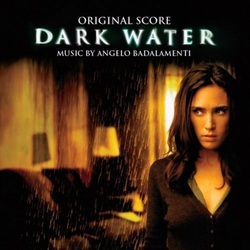
Scoring Walter Salles' remake was Angelo Badalamenti, the composer best known for his longstanding collaboration with director David Lynch. I must admit from the start that I have never been overly keen on Badalamenti's work. The beautiful simplicity of his Cousins love theme alone, perhaps one of the most underrated romance cues of the 1980's, testifies to the composer's abilities, yet for some odd reason I still find myself, more often than not, disappointed by his scores. While his more notable contributions have dealt primarily with synth work (Mulholland Dr. and Twin Peaks), Badalamenti has also shown himself to be adept at wielding a full orchestra (as he does in this past year's stunning Stalingrad). Relying more heavily on Badalamenti's orchestral talents, Dark Water is a serviceably moody score highlighted by moments of chilly orchestral beauty at its beginning and conclusion. Where it fails is in its lack of ambition to transcend the tried and true horror clichés, and its reliance on almost lethargic suspense material.
The opening "Seattle, 1974" manages to draw you in with a mysterious soundscape of electronics and glass armonica shimmers, while an echoey piano taps out a recurring three-note motif. Also alluded to is the score's main theme, which is fully introduced in the following "The Tram (Main Title)". This identity, a sleepy but ultimately pleasant theme, plays out on an ensemble of strings, harp, and light choir, and is often punctuated by an ascending, 5-note motif. Reminding of a lesser Christopher Young effort, this chilly ensemble grows more robust in the "End Credits" track, during which the theme receives its fullest treatment. Also contained in both cues is a rumbling cello figure that makes numerous appearances during the score's midsection.
Unfortunately, this midsection is where Badalamenti's score begins to falter, and interest begins to wain. I do not mean to suggest that the composer has made any egregious misstep, or that this is overwhelmingly bad music. Rather, it is underwhelmingly standard horror fare. Strings meander and atmospherics abound, as "The Drip Stain", "Flotsam", "Deluge in 10F", "A Ghost in the Machine", and "New Nightmare" all explore the same general terrain. And believe me, this is familiar terrain. The music inoffensively lurks and winds around the score's three-note mystery motif, but there's little here to make you sit up and take notice. The more forceful concluding portion of "Mom from Hell", however, does manage to command a little more attention with a nightmarish, serpentine idea at 1:32. In general, when Badalamenti injects some life into his suspense material with bigger, more aggressive orchestrations, you become forced to bat the sleep out of your eyes. Portions of "Hello Again Kitty", "The Water Tower", and "The Sacrifice" exemplify this (at 2:15 in the latter cue, chopping strings give great momentum to the three-note mystery motif). "Final Elevator" also serves as a nice thematic catharsis from the middling suspense material and carries the score into the worthwhile "End Credits".
Dark Water is no doubt one of Angelo Badalamenti's lesser efforts. Though not dire, the score's middle portion lacks a certain punch that could elevate it above all the meandering, creepy strings and inelegant stinger moments that are expected of the average horror score. Quite simply, Dark Water is content to serve its purpose and accomplish not a note more. Only the score's appealing main theme featured in "The Tram (Main Title)" and "End Credits" redeems this largely inoffensive snooze.
| A Few Recommended Tracks: "The Tram (Main Title)", "End Credits" Label: Hollywood Records Availability: 14 track edition | |

 RSS Feed
RSS Feed
